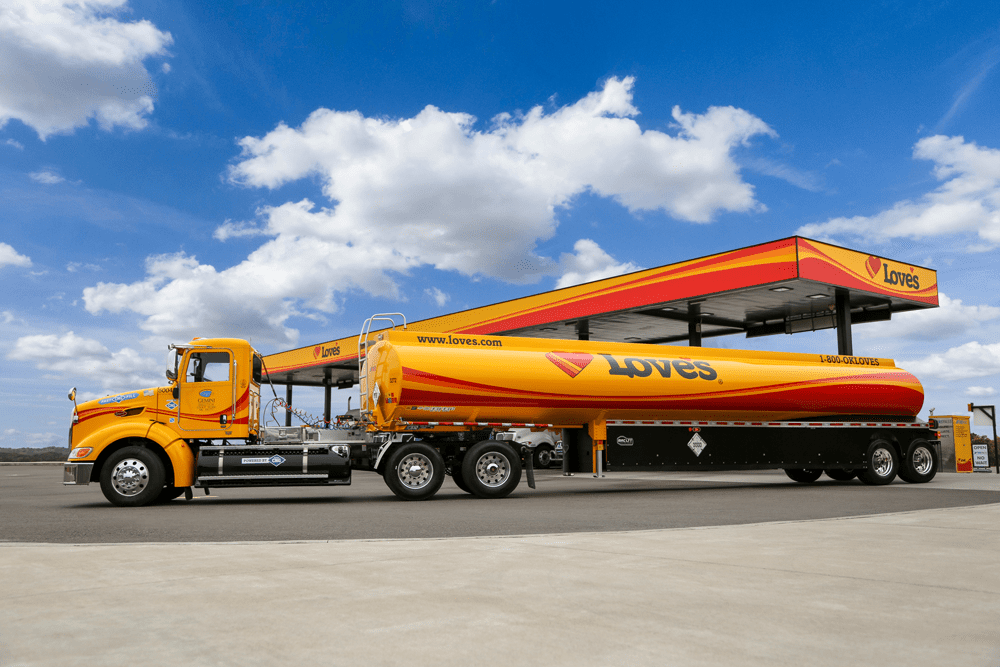In partnership with: Trillium

Fleets are under constant pressure to navigate a complex balance of traditional and alternative power supply sources to cut through the hype and determine what works for their needs. At the same time, fleets must also work to reduce emissions, increase efficiency, and cut fuel costs. The Love’s Family of Companies understands that fleets have a need for a varied portfolio of fuels and not only provides that flexibility and savings to trucks fueling at Love’s Travel Stops but also puts their money where their mouth is and fuels its own fleet with renewable, low-carbon, alternative fuels.
Gemini Motor Transport has been the primary fuel hauler and carrier for Love’s Travel Stops and Country Stores since 2001. Gemini’s 1,450 professional drivers combine for more than 100 million miles annually across the U.S. Utilizing a network of 950 trucks, Gemini distributes millions of gallons of fuel to more than 560 Love’s locations nationwide. Gemini’s expansive fleet fueled with a portfolio of alternative fuels including compressed natural gas (CNG), renewable natural gas (RNG), biodiesel, and renewable diesel. Implementing this array of alternative fuels allows the Gemini fleet to choose the fuel that works best for each situation, displacing more than 14 million diesel gallon equivalent of conventional diesel annually without sacrificing performance, reliability, or efficiency.
“Reliability, cost effectiveness and fuel efficiency are key for every truck in the Gemini fleet regardless of the powertrain. We have worked closely with manufacturers to ensure we have the right trucks powered with the most efficient fuel for every route and we are seeing the benefits across the board including improved efficiency, and reduced fuel costs all with less emissions,” said Brent Bergevin, vice president of transportation for Love’s.
Gemini began deploying natural gas vehicles (NGVs) in the mid-2010s and has plans to increase the number of NGVs in its fleet to take advantage of Love’s expanding CNG network, especially in California. Gemini’s natural gas fleet displaces over 1 million diesel gallon equivalent annually and that continues to grow as the fleet expands its use of low- or even carbon-negative RNG.
“As a 24/7 provider to hundreds of locations across the country, we need reliable fuels that play a role in creating a sustainable future,” said Bergevin. “These alternative fuels deliver that and much more.”
RNG is fuel produced by capturing and cleaning fugitive methane emitted from the decomposition of organic waste, produced by wastewater treatment plants, dairy farms, landfills, and other sources. It is an ultra-low-emission drop-in replacement for fossil CNG for use in all medium- and heavy-duty applications including goods movement, transit, and refuse. Depending on the feedstock, RNG can even be a carbon-negative fuel as measured by its carbon intensity value (or the total amount of greenhouse gas emissions emitted from production, transportation, refining and consumption of the fuel). RNG sourced from dairy waste, for instance, can have carbon intensity ratings that are 200% to 300% lower than even a battery electric vehicle powered by renewable energy such as solar or wind.
Gemini began fueling its natural gas fleet with RNG in 2019 and is working with Trillium, a member of the Love’s Family of Companies, to grow its RNG fuel portfolio. The goal is to meet 100% of its fleet demand for CNG, both inside and outside California, with RNG.
By leveraging the vast Love’s and Trillium network of fueling stations across the country, fleets can bundle multiple fuels and services to fit the needs of trucks today and well into the future which means even more savings, flexibility, fueling locations and financing options.
Gemini also works to reduce the impact of its diesel-powered fleet with the use of biodiesel and renewable diesel. Made from a diverse array of feedstocks, biodiesel and renewable diesel fuel are renewable, clean-burning replacements for traditional fossil diesel. Both can be used without vehicle modifications and don’t require additional investments in refueling or recharging infrastructure or the purchase of new trucks or engines. Gemini uses biodiesel blends of up to 20% (B20) and together with renewable diesel fuel makes up almost 10% of the fleet’s diesel fuel consumption.
To learn more about Trillium’s portfolio of fueling solutions, visit www.loves.com/trillium.


